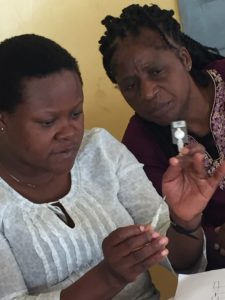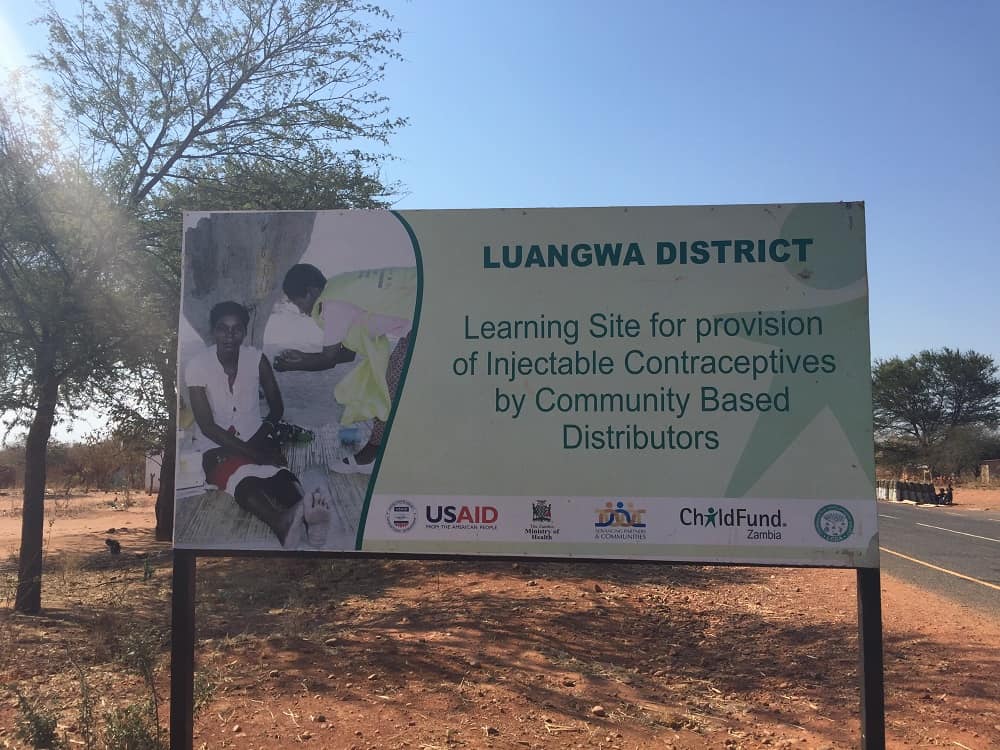Billboard Campaign in Zambia Makes it Easier for Women to Get Family Planning Information
August 30th, 2018 | news
Every Saturday on the outskirts of the small town of Luwanga, Zambia, hundreds of women walk along a dusty road that is barely more than a path to the riverbank. About a year ago, a sign appeared at the side of the road informing people that a new form of contraception was available in town. Injectable depot medroxyprogesterone acetate (DMPA) is a small, easy-to-use, prefilled three-month injectable contraceptive that is expanding the contraceptive method mix in Zambia.

According to the World Health Organization, family planning is one of the most effective ways to prevent maternal, infant, and child mortality; increase economic opportunities for and lift families out of poverty; and help young people realize their full potential. Yet in Zambia, a landlocked country in sub-Saharan Africa with a population of more than 13 million people, women have an average of 6.2 children. Twenty-seven percent of women of childbearing age lack access to family planning, and of the 41 percent of women who do use birth control, only 32.7 percent use a modern method.
In 2012, the Zambian Government set a goal to boost the modern contraceptive prevalence rate to 58 percent by 2020. So far, this effort has increased access to family planning throughout the health service delivery system which includes hospitals, health centers, health posts, and mobile clinics. The government has also accelerated the introduction of DMPA administered in an intramuscular (IM) form and more recently, subcutaneously (SC). Both DMPA-IM and DMPA-SC are safe and highly effective at preventing unintended pregnancies and are delivered every three months.
Since 2014, ChildFund has partnered with the USAID-funded Advancing Partners & Communities (APC) project to reduce Zambia’s high fertility rate and low uptake of family planning in target regions. ChildFund has been training community-based distributors (CBDs) in Zambia for 10 years to provide oral contraceptives and condoms. In 2015, ChildFund began working with the Ministry of Health (MOH), the Ministry of Community Health and Maternal and Child Health (MOMH), and other partners to create a learning site that can serve as a model for national scale-up of community-based family planning (CBFP). A learning site is an area within a district health system identified by the MOMH that has a high-functioning CBFP program.

Luangwa, the headquarters of a district of the same name in Zambia’s Lusaka Province, was established as a learning site in 2015 with support from APC. Many CBDs in Luangwa were already working as traditional birth attendants, malaria agents, and HIV and lay counselors. APC trained 22 CBD supervisors and 63 CBDs to provide counseling services and distribute condoms, pills, and injectables. ChildFund and the MOH also trained CBDs to gather data using tools. The data gathered include the number of injections administered, oral pills and condoms distributed, new acceptors of family planning, age of clients, and other relevant information. CBDs are encouraged to share this data with their home facilities every month to avoid reporting gaps and inconsistencies.
In 2016, ChildFund, with support from APC, erected three billboards, one at Luangwa District entrance and two within the district. The billboards, which are located in heavily traveled areas, have gained attention from community members and organizations. APC, ChildFund, and local- and district-level partners have begun a pilot to scale up community-based distribution of DMPA in two additional districts, Mumbwa and Shibuyunji.
Because of the success of the community-based approach to DMPA distribution, there are plans to introduce community-based distribution of emergency contraception pills (ECPs) in Luangwa and Mumbwa districts. ECPs offer women a safe and effective way to prevent pregnancy after unprotected intercourse, whether as a result of rape, a lapse in use of one’s usual method, or simply not having a method of birth control. Presently, ECPs are not widely available at the community level so many rural women can’t get them. And while ECPs can be obtained free at public facilities, few people know it. A learning site will change this. ChildFund and APC are conducting a rapid assessment to determine next steps, which will include training CBDs in ECPs and conducting mobilization and sensitivity campaigns to dispel myths about and avoid misuse of ECPs.
Expanding family planning services from traditional health facilities to a community setting can be complicated and takes considerable time to garner support and develop systems. However, we are seeing that through an effective billboard campaign and strong partnerships, learning sites can make it easier for women to get family planning information and services.
To learn more about the ChildFund Learning Site or the APC project, please visit www.advancingpartners.org.
We strive to build lasting relationships to produce better health outcomes for all.